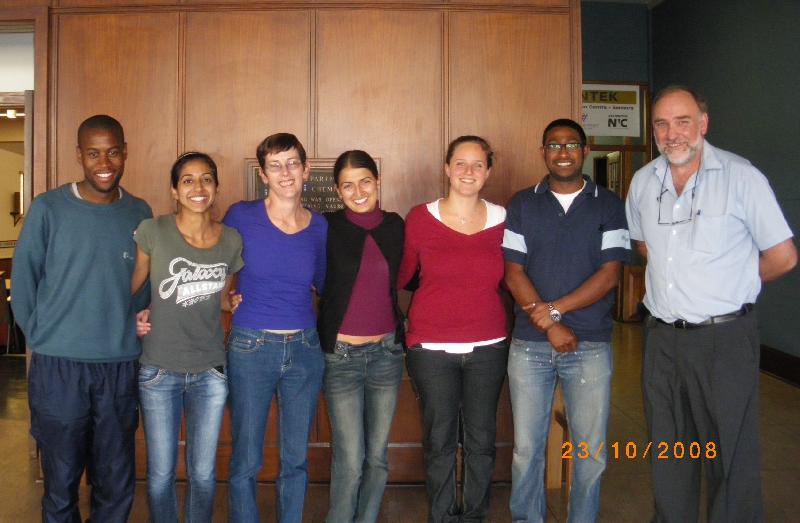
In 2008, Tim Harrison, Bristol University’s ChemLabS School Teacher Fellow and Director of Outreach, and Professor Dudley Shallcross, Director of the Astra-Zeneca Science Teaching Trust and Professor of Atmospheric Chemistry at the University of Bristol, visited Sci-Fest Africa to put on their popular lecture demonstration, “A Pollutants Tale.”
Within hours of meeting Professor Davies-Coleman of the Rhodes University Chemistry Department, the seeds of a collaboration had been sown. This saw Prof Davies-Coleman visiting Bristol in the United Kingdom shortly thereafter and, in September 2008, four postgraduate students from the Department accompanied Academic Development Lecturer Mrs Joyce Sewry on a one week visit to Bristol University, funded by Afrox. While in the UK they worked with British school children, and then helped to set up a similar programme here on their return.
“A Pollutants Tale” is a two-fold outreach effort which aims to educate children and young adults about climate change; both what it is and how we as humans can lessen our impact on the climate. The lecture demonstration makes use of dry ice and liquid nitrogen, giving kids the opportunity to actually see a gas which makes up 78% of our atmosphere. The talk is followed by a fun workshop for the children, supervised by the students, where they get to set up an iodine clock reaction and react elements such as magnesium with acids. Both reactions are designed to measure the speed of reactions and show the learners how important proportions are in chemical reactions.
“A Pollutants Tale” has been presented to children ranging from primary school to tertiary age, and is designed to introduce actual practical experiments to kids who have previously worked only with textbooks. The response, says Dr Sunny Sunassee, a Post Doctoral Research Fellow in the Chemistry Department, has been highly positive, with children extremely eager to get involved, particularly in the workshop phase of the presentation.
Earlier this year Dr Sunassee, Chairman of the Young Royals Society, applied for and gained funding from SEEDS to take “A Pollutant's Tale” on the road to the Western Cape. The lecture tour reached 1385 Western Cape learners, with the lecture demonstration being presented at schools such as Amstelhof Primary School in Paarl, and St Idas Primary School in Stellenbosch. Dr Sunassee is hoping to take to the road again towards the end of 2011 or early in 2012, and would like to see the lecture tour reach other areas of Southern Africa, including Namibia and Botswana.
Mrs Sewry is very keen to point out that schools in the UK pay for the privilege of having lecture demonstrations. Here in South Africa, chemistry students voluntarily present the lecture and run the workshops, as schools can not, in general, afford to pay. 2011 will for the first time see Rhodes students presenting “A Pollutants Tale” at Sci-Fest.
Additionally, Bristol ChemLabS have donated a programme called Dynamic Laboratory Manual and Laboratory Skills (worth R70 000 in computer license fees) to Rhodes Chemistry Department. This is essentially a pre-practical interactive programme, which acts as a fantastic bridging device for first year students who, in many instances, have never had the opportunity to undertake practical chemistry work. “This will revolutionize the way we upskill our first year students in practical chemistry,” explained Prof Davies-Coleman.
Recently a further development has occurred which shows quite how valuable a mutually collaborative environment between universities can be. As the outreach programme evolved and grew, a further collaboration was made possible between Rhodes University and Bristol ChemLabS. Profs Davies–Coleman and Shallcross are in the process of setting up the Bristol Rhodes Atmospheric Chemistry Research Project to look at volatile halocarbons, both man-made and those from natural sources, initially in the air above Grahamstown and then from the air above the ocean in Algoa Bay, which are contributing to climate change. The climate change research in Algoa Bay (tentatively given the acronym C-CRAB) will be carried out in conjunction with the South African Environmental Observation Network (SAEON). The University of Bristol is donating the necessary atmospheric chemistry research equipment (a gas chromatograph mass spectrometer) to get the project off the ground. C-CRAB will have its own building on the outskirts of campus away from any possible contamination from the substances in the Chemistry Department. The ultimate goal of this project is to become incorporated into Southern Oceans research and travel south to measure the naturally occurring halocarbons in the Southern Ocean off Antarctica.
Picture: from left to right: Matshawandile Tukulula, Preeti Kaur (Bristol), Mrs Joyce Sewry, Linda Sellou (Bristol), Sarah Abel, Dr Sunny Sunassee, Prof Davies-Coleman.
